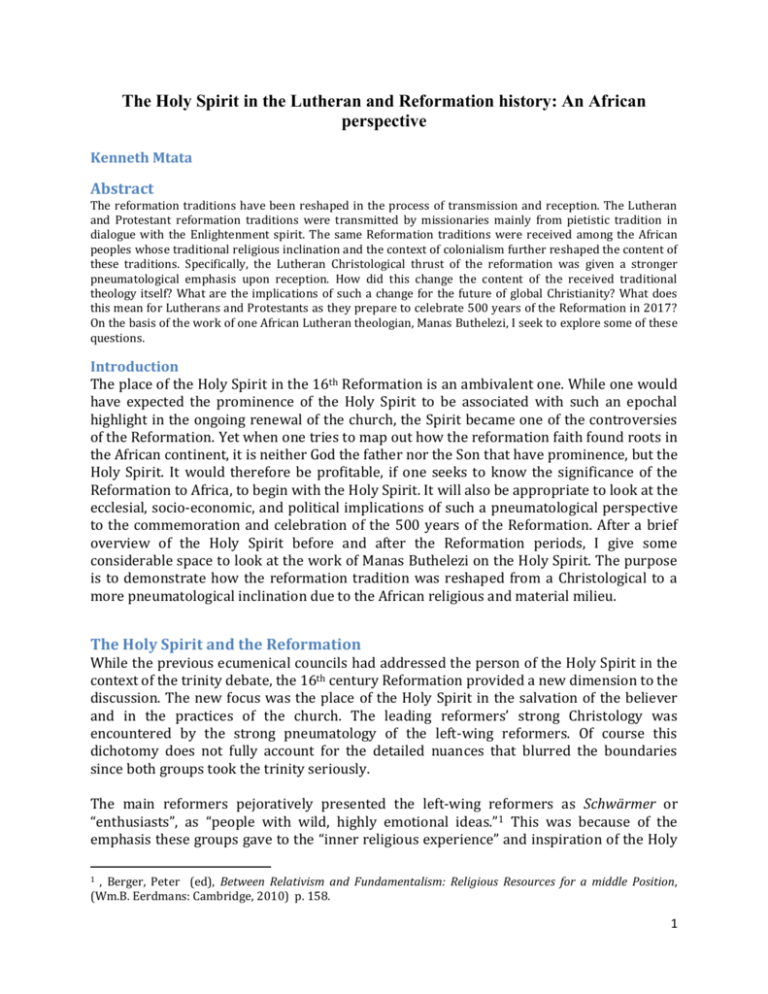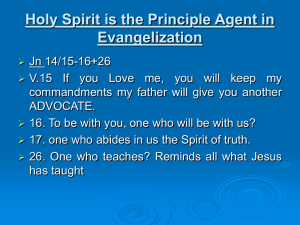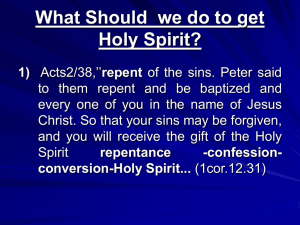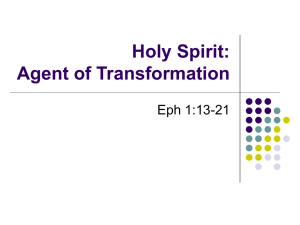The Holy Spirit in the Lutheran and Reformation history: An African
advertisement

The Holy Spirit in the Lutheran and Reformation history: An African perspective Kenneth Mtata Abstract The reformation traditions have been reshaped in the process of transmission and reception. The Lutheran and Protestant reformation traditions were transmitted by missionaries mainly from pietistic tradition in dialogue with the Enlightenment spirit. The same Reformation traditions were received among the African peoples whose traditional religious inclination and the context of colonialism further reshaped the content of these traditions. Specifically, the Lutheran Christological thrust of the reformation was given a stronger pneumatological emphasis upon reception. How did this change the content of the received traditional theology itself? What are the implications of such a change for the future of global Christianity? What does this mean for Lutherans and Protestants as they prepare to celebrate 500 years of the Reformation in 2017? On the basis of the work of one African Lutheran theologian, Manas Buthelezi, I seek to explore some of these questions. Introduction The place of the Holy Spirit in the 16th Reformation is an ambivalent one. While one would have expected the prominence of the Holy Spirit to be associated with such an epochal highlight in the ongoing renewal of the church, the Spirit became one of the controversies of the Reformation. Yet when one tries to map out how the reformation faith found roots in the African continent, it is neither God the father nor the Son that have prominence, but the Holy Spirit. It would therefore be profitable, if one seeks to know the significance of the Reformation to Africa, to begin with the Holy Spirit. It will also be appropriate to look at the ecclesial, socio-economic, and political implications of such a pneumatological perspective to the commemoration and celebration of the 500 years of the Reformation. After a brief overview of the Holy Spirit before and after the Reformation periods, I give some considerable space to look at the work of Manas Buthelezi on the Holy Spirit. The purpose is to demonstrate how the reformation tradition was reshaped from a Christological to a more pneumatological inclination due to the African religious and material milieu. The Holy Spirit and the Reformation While the previous ecumenical councils had addressed the person of the Holy Spirit in the context of the trinity debate, the 16th century Reformation provided a new dimension to the discussion. The new focus was the place of the Holy Spirit in the salvation of the believer and in the practices of the church. The leading reformers’ strong Christology was encountered by the strong pneumatology of the left-wing reformers. Of course this dichotomy does not fully account for the detailed nuances that blurred the boundaries since both groups took the trinity seriously. The main reformers pejoratively presented the left-wing reformers as Schwärmer or “enthusiasts”, as “people with wild, highly emotional ideas.”1 This was because of the emphasis these groups gave to the “inner religious experience” and inspiration of the Holy , Berger, Peter (ed), Between Relativism and Fundamentalism: Religious Resources for a middle Position, (Wm.B. Eerdmans: Cambridge, 2010) p. 158. 1 1 Spirit. One such a typical group comprised of the three “plebeian prophets” from the mining town of Zwickau where there had been the previous Hussite influence.2 These prophets and their followers claimed “direct inspiration from the Holy Spirit”, “denounced infant baptism, called for the elimination of the clergy, and predicted the imminent end of the world.”3 Andreas Karlstadt was also sympathetic and a leading figure of this movement. He sought, in addition to Germanising the liturgy, to address the socio-political and economic grievances of his people in his sermons through the power of the Spirit.4 Also Thomas Müntzer is alleged to have pointed to the superiority of the Holy Spirit to the Holy Scriptures; that “God’s direct speaking to the soul was a more certain witness of the truth than the plain scriptural text: the letter killed but the spirit quickened.”5 It is well-known however that some exaggerations tended to characterize each other’s views and to paint the left-wing reformers with one brush. For instance, there were many left wing reformers for whom the emphasis on the experience of the Holy Spirit did not exclude the validity of the Holy Scriptures. Instead, the Spirit was seen as behind both the initial inspiration and the subsequent illumination of the scriptures.6 Luther disagreed with the left-wing reformers, not because he did not believe in the experiential aspect of faith. He rejected the emphasis on internal experience as the basis for faith because, for him, human beings encountered God through the means outside themselves (extra nos), through the scripture, the word of preaching and the sacraments. It was not only Martin Luther who believed and taught that faith was not a result of free will but the gift that God gave by the Holy Spirit through the Word. “God grants his Spirit or grace to no one except through or with the preceding outward Word”, he said.7 The three main means through which the Holy Spirit came to human beings were the “sermonic words, baptism, and the Lord’s supper.”8 There is a shift from questions regarding the nature and identity to concerns of function of the Holy Spirit during and after the Reformation. The Holy Spirit was presupposed as the initiator of rebirth and renewal of both the individual and the church from the beginning of the church. The early church fathers recognized the ministry of the Spirit as the active involvement of the Godhead from the time of creation. Martin Luther and the magisterial reformers saw the Spirit as necessary force behind the birth of faith and the energy of all subsequent transformation of the believer though the Word and the sacraments. Even The Hussites were a medieval Christian movement from Czech who followed the tradition of the earlier reformer, Jan Hus (c. 1369–1415). In Reformation legends, Hus is believed to have prophesied the rise of Martin Luther. 3 Malia, Martin and Emmons Terence, History's Locomotives: Revolutions and the Making of the Modern World, (Yale University Press, 2006) pp. 77-78 4 Malia, Martin and Emmons Terence, History's Locomotives, p.78 5 Malia, Martin and Emmons Terence, History's Locomotives, p.79 6 Kärkkäinen, Pneumatology, p.46 7 Schmakald Articles, Erlangen, 25:140 8 Bayer, Oswald, Martin Luther’s Theology: A Contemporary Interpretation, (WB Eerdmans Publishing: Cambridge, 2003), 243. 2 2 though these reformers rejected claims that exalted personal experience of the Spirit, they did not deny the immediate operation of the Spirit in the individual and the church for the on-going vitality of the church. It was this understanding of the Holy Spirit as creator of faith that influenced mission theology of the 19th century Europe compelling the sending of missionaries to the African continent. From Luther to Africa: The missionary factor Christianity of the 16th century reformation tradition was introduced to Africa by the missionaries in the 19th century, although earlier sporadic missionary acts by the Catholic Jesuits are also known in East Africa from the late 16th century.9 Before the arrival of these European missionaries, however, there was Christian presence already as a result of earlier contacts between Africa and the Mediterranean world. As depicted in the Acts of the Apostles (8:26-40), there could have been some Africans at the outpouring of the Holy Spirit and birth of the Church at Pentecost in Jerusalem. Some African theologians would want to go further in seeing the church Fathers like Augustine and Cyril of Alexandria as the flowering of the early planting of Christianity in Africa that dates back to the first century. If they are correct, it means that the earliest African Christian tradition “emerges and matures broadly speaking between 42 and 692 C.E. That is 660 years of African Christianity before the Arab Conquest.”10 In this understanding therefore, when the western missionaries arrived in Africa, they were not necessarily bringing a new religion. “Christianity has never departed Africa. In some ways, the Church is now returning to its African roots”, Oladipo would say.11 Yet, it should be noted that when the large number of missionaries came to Africa around the 19th century, they were not spreading the same Christianity that had been in the isolated parts of the continent before. This was something new. First and foremost, Christianity of the missionaries was now part and parcel of the colonial package. On one hand, missionary theology served, intentionally or unintentionally, to buttress subservience among the colonized masses. Through a literal interpretation of Romans 13:1 which says, “Let every person be subject to the governing authorities. For there is no authority except from God, and those that exist have been instituted by God”, this new Christianity was not always the liberating news of the Reformation. For some Lutheran missionaries, the relationship with the colonial system could be understood through a simplistic reading of Martin Luther’s ‘Two Kingdoms’ theory. On the other hand, it was the missionary education, health system and general personal developmental approach that allowed Africans to get connected to the good news of the Reformation. For example, Cathal J. Nolan (editor), The Age of Wars of Religion, 1000-1650: An Encyclopedia of Global Warfare and civilization, Volume 1 (Greenwood Press: Westport, 2006), p. 487. 10 Oden, Thomas, C. How Africa Shaped the Christian Mind: Rediscovering the African Seedbed of Western Christianity, (Inter-Varsity Press, 2007),p.125. See also Kwame Bediako, Christianity in Africa: The Renewal of a Non-Western Religion, (Edinburgh University Press: Edinburgh, 1995). 11 Caleb Oluremi Oladipo, The Will to Arise: Theological and Political Themes in African Chrstianity (Peter Lang: New York, 2006), p. 115. 9 3 almost all the political movements in Africa were led by Africans who had been educated and mentored by European missionaries. To come back to our theme, it should be observed that the framework of the passing on and reception of the Reformation evangelical heritage was filtered through the double screen of missionary pietistic tradition and a traditional African spirituality. The missionary outlook was responding to a multiple forces but two main ones, the growing enlightenment influence back home and the wild pagan culture in the missionary field. So while western missionaries felt obliged to exorcise the Africans of their ‘paganism’, they also saw in Africans, an opportunity to preserve the ‘original’ Christian religion not contaminated by shades of growing secularism and industrialization characteristic of their home countries. It is known, for example, that Berlin missionaries in Southern Africa “encouraged a patriarchal society with the missionary taking the place of the chief.” These missionaries welcomed African customs and African spirituality within certain limits.12 This “dialectics of rejection and incorporation of the African world of spirits and gods”13 characterized the period of the missionaries that lasted until the end of the first half of the 20th century when Africans begun to claim the right to forge the agenda of Christianity in Africa. It is within this framework one should seek to understand both the Reformation Effects and the trajectory of African Christianity to its contemporary manifestations. African religiosity before and after the missionaries As has been indicated above, African religiosity before the arrival of western missionaries, which has also remained the basis for subsequent spirituality was and is based on strong expressive religious experience tied to the socio-political and economic realities of the people. This religiosity was characterized by an understanding that human beings were “not alone in the universe, for there is a spiritual world of powers or beings more powerful and ultimate than” us.14 It was further believed that human beings could “enter into relationship with the benevolent spirit-world and so share in its powers and blessings and receive protection from evil forces by these transcendent helpers”.15 The reality of the afterlife and the “important place of the ancestors or the ‘living dead’” who remain “united in affection and in mutual obligations with the ‘living living’”, was taken seriously and serviced through various rituals.16 The African’s was a “sacramental universe where” “no sharp dichotomy” existed “between the physical and the spiritual.” Instead, the physical acted as a “vehicle for ‘spiritual’ power”, while the physical realm was held to be patterned on the model of the spiritual world beyond” and that such sets of powers, principles and patterns ran “through all things on earth and in the heavens and welds then into a unified Hexham, Irving and Poewe, Karla, The Spread of Christianity among Whites and Blacks in Transorangia,in Christianity in South Africa: A Political, Social, and Cultural History, edited by Elphick, R. and Davenport, R. (University of Carlifornia Press: Berkeley, 1997) pp. 121-134, here p.132 13 Heuser, Andreas, The Embattled Body in African Pentecostal-type Christianity, in Embodiments of Cultural Encounters, edited by Sebastian Jobs and Gesa Mackenthun, (Waxmann Werlag: Münster, 2011), pp. 115-140, here p. 120 14 Bediako, Christianity in Africa, 94. 15 Bediako, Christianity in Africa, 94. 16 Bediako, Christianity in Africa, 94. 12 4 cosmic system”.17 This was the religious field into which the reformation message brought by the missionaries fell. How would it grow? Initially missionaries made no single Christian convert as theirs and the African universes did not find corresponding categories. Conversion was achieved, at a large scale, through education in the missionary schools and of the Africans who would have run away to seek refuge in mission centers. This rate conversion was not as rapid as when Africans themselves started preaching and communicating the gospel message using their own African worldview as a medium of passing on the message. But even then, the church remained in the hands of the western missionaries both in terms of governance and theological framework. This would not last long. The beginning of the 1950s saw a steady increase of political independence of the African states from colonialism. This also triggered a growing interest among Africans to take leadership of the churches and redefining the theological agenda of the African church. It should be noted that even before this time, African indigenous churches had sprout out the whole sub-Saharan Africa with their emphasis on the movement of the Holy Spirit. These churches sought to relate their African religious outlook to their Christian faith. These churches, also known as ‘churches of Spirit’, characterized what would define African Christianity to the present day, an emphasis on the Spirit. The late Ogbu Kalu, a leading African theologian observed that this “pneumatic factor in Christianity that resonates with the vibrancy of primal African spirituality” was the reason behind the Pentecostal and charismatic character of Africa in recent years.18 While many scholars have observed the Holy Spirit as characterizing Africa Christianity, it is surprising that not much work has been committed to investigating this phenomenon.19 The Spirit and Lutheran reception in Africa Initially, the Lutheran churches in Africa mimicked their founding European mother churches, at least in practice. In belief it was a different story. African Lutheran Christians tended to be Lutherans during the day and before the surveillance of their European counterparts but secret members of the African Indigenous or Spirit Churches during the night. The reason was simple to understand; many of these Christians identified with the practices in the Spirit Churches because the later represented the African spirituality better than the Lutheran and other missionary-founded churches. I remember during my days as a pastor in an urban Lutheran church when members of my congregation would disclose how they used to visit a prophet in the African Indigenous church in order to get the service that we in the Lutheran liturgical tradition could not provide. In a sense, the way Bediako, Christianity in Africa, 95. Kalu, Ogbu, U. Power, Poverty and Prayer: The Challenge of Poverty and Pluralism in African Christianity 1960-1996 (Peter Land: Frankfurt, 2000), p.105 19 Among the scholars to have observed this are, Ranger, Terance, Evangelical Christianity and Democracy in Africa, p. 181ff; Muzorewa, Farai David, Through Prayer to Action: The Rukwadzano Women of Rhodesia, p.258ff; Oosthuizen, Gerhardus Cornelis, The Healer-Prophet in Afro-Christian Churches, (E. J. Brill: Leiden, 1992) p. 70ff 17 18 5 the Lutheran and Reformation tradition was passed on through the medium of the European missionaries did not fully meet the needs of the African person especially his spiritual inclination. When African theologians, even those trained in the west, started theologizing from their indigenous spiritual disposition, the subject of the Spirit became an important one. As VeliMatti Kärkkäinen has observed, the growth of contextualized understandings of the Spirit in the global south, but especially in Africa, have tended to “complement the mainly Western approach that” had dominated the Reformation theological reflection for a long time.20 In this light let me commit some space to Manas Buthelezi, one eminent African Lutheran Theologian who gave a detailed study about the Holy Spirit from his African perspective. Bishop Dr Manas Buthelizi (born 1935) is mainly known for his black theology and liberation theology work from the 1970s.21 His work emerged from the context of apartheid and racial discrimination in South Africa. In his black theology, Buthelezi sought to develop a theological anthropology highlighting the equality of all before God, hence a criticizing the apartheid program of separate development. His theological method had the experiences of the segregated black people as its point of departure. Through this theology he sought to stimulate the agency of the black people so that they could contribute to their own emancipation and development. On the surface, the Buthelezi of black theology appears drastically different from the one after 2000; the latter talks about the Holy Spirit. While during his days in liberation theology, he was more of a political activist, after his tenure as bishop of the Lutheran Church in South Africa, he became more of an evangelist and spiritual healer. During his days of liberation theology, his interlocutors and audience were the university students, pastors, church leaders and international organizations whom he sought to mobilize against the apartheid regime. As a teacher on the Spirit, his audience has become the ordinary members of the Lutheran Churches. When I asked him why such a shift, he told me that as a contextual theologian, he always sought to address the most urgent pressing needs and questions of his time. At the present moment, the question of the Holy Spirit has become urgent for Buthelezi. Veli-Matti Kärkkäinen, Pneumatology: The Holy Spirit in Ecumenical, International, and Contextual Perspective, (Baker Book House: Grand Rapids, 2002), p.147 21 Manas Buthelezi in "The Theological Meaning of True Humanity," in The Challenge of Black Theology in South Africa, ed. Basil Moore (Atlanta: John Knox Press, 1974); Buthelezi, M. 1972 An African Theology or A Black theology. Pages 3-9 in Mothlabi, Mokgethi (ed), Essays on Black Theology. [Black Theology Project] University Christian Movement: Johannesburg. ———. 1972 The Theological Meaning of True Humanity. Pages 70-80 in Mothlabi, Mokgethi (ed), Essays on Black Theology. [Black Theology Project] University Christian Movement: Johannesburg. ———.1973 African Theology and Black Theology: A Search for a Theological Method. Pages 18-24 in Becken, Hans-Jurgen (ed), Relevant Theology for Africa: Report on a Consultation of the Missiological Institute at Lutheran Theological College, Mapumulo, Natal, September 1221, 1972. Durban: Robinson & Co. 20 6 Buthelezi has been talking about the Holy Spirit for some years now, at least just sometime before his retirement in 2000 until now. One of his most comprehensive approach to the subject is in the presentation he made in June 2002 at a Lutheran World Federation consultation on Renewal Movements in Lutheran Churches held at Moshi, Tanzania. Here he articulated the circumstances surrounding the shift of his theological focus and his theological approach. He characterized his presentation as “something between a sermon, a bible study and a personal experienced.”22 His first reference to the Lutheran and Reformation tradition was, “according to our confessions…”, by which he referred to the Nicene Creed in which the Holy Spirit is presented as “worshiped and glorified” together with the father and the son.23 In other words, Buthelezi understood himself standing in the evangelical tradition going back to the apostolic period through the church fathers and reclaimed by the 16th century Reformation. He evinces some continuity between the arche and telos of his previous and the current theological approach as that of orthopraxis, not only orthodoxy. He interested in the subject of the Holy Spirit is not mainly about metaphysical explication of the nature of the Spirit but of the gifts of the Holy Spirit as the “vital deposits of power for effective ministry”. As a true contextual theologian he starts with his own experience and the experience of his church. But this starting point is what Carter Lindberg has called the “neuralgic point for Lutheran” theological study of the Holy Spirit, i.e. starting with human experience.24 Buthelezi narrates that he began not only to theologically reflect about the Holy Spirit but also provide liturgical spaces for his Lutheran congregations to experience the Holy Spirit as a result of the questions from his congregants. One of his congregants had asked him how one could be filled with the Holy Spirit. Even though Buthelezi was conversant of the Lutheran pneumatology which state that the Holy Spirit is received through the preaching of the word and the administration of the sacraments, he felt that this theology of the Holy Spirit he had inherited from his seminary training “was not user friendly. It was something that made sense only to theologians and it lacked the dimension of practical application to the simple needs and activities of an ordinary congregation”.25 What then is Buthelezi’s understanding of the Holy Spirit? For Buthelezi, the Holy Spirit should first and foremost be sought in the ministry of Jesus. One cannot understand the “Holy Spirit and open ourselves to His power, if we forget in the first place what Jesus said about the Holy Spirit.”26 Here Buthelezi is consistent with Luther’s Christocentric hermeneutics. For him, Jesus Christ is not only a principle and content of preaching and theology but also an exemplar upon which ministry must be modeled. One such learning point, according to Buthelezi is to multiply through ministerial equipment of those who could do what Jesus did in his life time. According to Buthelezi, the Buthelezi, Manas, The gifts of holy spirit for the healing of world, in Consultation on renewal movements in the Lutheran Churches in north and south, edited by Rasolondraibe, Peri (The Lutheran World Federation: Geneva, 2002). 23 Buthelezi,The gifts of holy spirit for the healing of world, p.9. 24 Lindberg, Carter, The Third Reformation: Charismatic Movements and the Lutheran Tradition, (Mercer University Press: Macon, 1983),p.234 25 Buthelezi,The gifts of holy spirit for the healing of world, p.10. 26 Buthelezi,The gifts of holy spirit for the healing of world, p.11. 22 7 gifts of the Holy Spirit allow ordained and lay ministry to converge around the same source of power and replicate the signs and wonders that Jesus performed in his earthily ministry.27 Informed by John 14, Buthelezi is confident that Jesus expected his disciples to “do more and greater miracles than he had himself” had done “while he was still on earth.”28 Jesus said this in the full awareness of the limitations of human nature, which could only be addressed by the Holy Spirit, Buthelezi argues. For Buthelezi this dispensation of the work of the Holy Spirit “includes our time, the year 2002. He (the Holy Spirit) is still with us in the Lutheran Church, but we have unfortunately ignored him.” 29 In traditional Lutheran theology, Buthelezi would be viewed as slowly moving in the direction of “an adoptionist Christology that presents Jesus as the example we are to follow”.30 Buthelezi would not mind this label as he once said, “The maturity of the African church is only evident when Africa is able to produce its own heretics.” Buthelezi sees the Holy Spirit playing a central role in the process of interpreting the scriptures. He argues that while an exegete is able to attain head knowledge by appropriately rearranging and reconstructing the biblical text, this remains the ‘letter that kills’ without the Holy Spirit’s illumination. His conclusion on this subject of interpretation is that there is “a difference between knowing certain facts as part of head knowledge, and being led by the Holy Spirit in understanding the practical application of those facts.” 31 By referring to Luther, Buthelezi says it was the day the scriptures came alive through the power of the Holy Spirit after diligent study that Luther felt as if he was born again. Buthelezi was aware that those who talked about the Holy Spirit in their Lutheran churches in his diocese were confronted by the injunction: “it is un-Lutheran”. Buthelezi’s ministerial or functional approach to pneumatology leads to a predictable logical conclusion of the discussion on justification and sanctification and the old “ordo salutis” debate. While others thought that ordo salutis, describing the processes “by which the work of salvation, wrought in Christ, is subjectively realized in the hearts and lives of sinners”, was an 18th century discussion, some actually see “Luther’s personal struggle” as a “search for a truly evangelical ordo salutis.”32 Buthelezi is aware of this Lutheran and Reformation problem. But for him, Lutherans have made mistakes in overemphasizing one aspect of theology above the rest. “If Luther were to rise from the dead he would be shocked at the strange things, which are done, under the cover of his name”, he says.33 One such shocking thing for Buthelezi is the overemphasis on “justification at the expense of teaching and preaching the totality of the principles of sanctification.” For Buthelezi this isolates “Jesus from the Holy Spirit” that Jesus taught so much about. Buthelezi sees two main functions of the sanctification in this context, (a) it is not about morality but ministry since the sanctified Buthelezi,The gifts of holy spirit for the healing of world, p.12. Buthelezi,The gifts of holy spirit for the healing of world, p.13 29 Buthelezi,The gifts of holy spirit for the healing of world, p.13. 30 Lindberg, Carter, The Third Reformation, p.236 31 Buthelezi,The gifts of holy spirit for the healing of world, p.14. 32 McGowan, A. T. B. Justification and the ordo salutis, in Justification in perspective: Historical Developments and Contemporary Challenges, edited by McCormack Bruce L. (Baker Academic: Grand Rapids,2006) pp. 147164 here p.148 33 Buthelezi,The gifts of holy spirit for the healing of world, p.13 27 28 8 are likely to be “more productive in their ministry and to be agents of the repetition of the apostolic tradition of performing signs and wonders, which Jesus initiated”; (b) it is a means of grace, that is, it is undeserved experience which God endows to a sinful human being, what Paul meant when he said, “We have this treasure in earthen vessels, to show that the transcendent power belongs to God and not to us (1 Corinthians 4:7)”. 34 By making the gifts of the Holy Spirit part of the means of grace, Buthelezi adds to the traditional Lutheran understanding of the Word and the sacraments as the means of grace to move towards John Wesley’s understanding.35 For Buthelezi, the work of justification is not superior to that of sanctification for they are both the results of the Holy Spirit. Summary I do not continue to reflect on Buthelezi’s detailed analysis of the gifts of the Holy Spirit especially healing which he deals with at length. I however observe some aspects of his understanding of the Holy Spirit; (a) the Holy Spirit is a neglected ministry in the Lutheran tradition because of the dominance of justification over sanctification, Christology over pneumatology; (b) His understanding is informed by his own personal ministry experience; for Buthelezi, experience is not inferior to reflection; (c) the Holy Spirit is attested in the bible but also functions to make holy Scriptures relevant to the life of the church; for Buthelezi, faithfulness to the Holy Scriptures is faithfulness to the Holy Spirit for the later inspired the former and continues to illuminate the former in the life of the church. Conclusion The centrality of the Holy Spirit at every turning point of the history of the people of God is evident from the creation, through Pentecost, the 16th century Reformation and the subsequent establishment and growth of Christianity in Africa. Informed by his African religious outlook, Buthelezi’s reflection on the Holy Spirit engages with this longstanding tradition of the Spirit. His position is consistent with the contemporary self-understanding of Christians in Africa, a region of the world where Christianity is growing fast. The implications of a pneumatological understanding of Christianity in the celebration and commemoration of the 500 years of the Reformation are both positive and negative. The negative potential of a pneumatic Christianity has already become evident in my own context in Africa. The recent growth of the personalities called prophets, moves beyond what Buthelezi envisaged. While for Buthelezi the Holy Spirit democratizes as well as globalizes ministry, recent developments have seen the growth of personality cults in which only a few individuals are deemed to be endowed with the Spirit and are entitled to benefits in cash and kind from their unquestioning followers. The growing Gnostic type of Christianity where a few individuals are said to have special illumination by the Holy Spirit seems to be buttressing a skewed economic system where gullible Christians are cheated into believing that if they give their hard earned money to these special prophets, they will be blessed with more from God. In a culture where personhood construction tends to be hierarchical, this emergence of a Holy few endowed with the Holy Spirit may actually 34 35 Buthelezi,The gifts of holy spirit for the healing of world, p.13-14 John Wesley, The Means of Grace: A Sermon. On Malachi ii. 7, (1848). 9 recreate the scenario confronted by Martin Luther and the other reformers when the gullible superstitious masses sought to earn their salvation through the indulgences. The positive potential is that the vitality of worship and the vibrancy of religion will be expected in the church. Dominant Christian theology will no longer be about the appropriateness of articulation of cold religious facts, but also a warm human intellectual and emotional experience of the faith. Experience will become part and parcel of legitimate theological work and not being perceived as destructive to ‘objective’ intellectual work. Particularly, the place of sanctification in the ordo salutis of the 21st century Christianity will prove to be very relevant in light of the deterioration of the public ethical orientation globally. The renewal of the church in Luther’s time initially decreased the gap between the academic theologian and the Christian on the pews. In the last two centuries or so, especially in some parts of the western world, the gap between academic pursuit has become disconnected with the life of the church. The Holy Spirit’s inalienable connection to human experience could provide a new way of synergy. That Buthelezi’s pneumatology is representative of the growing majority of the church requires further exploration so that both its benefits and dangers for the renewal of the church are identified as the Christian celebrates and commemorates 500 years of the Reformation. Thank you 10









